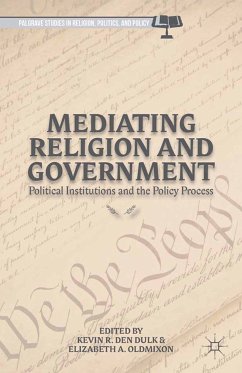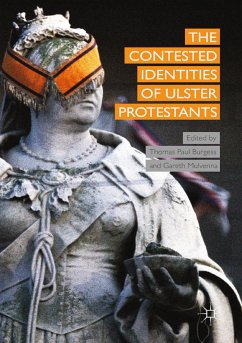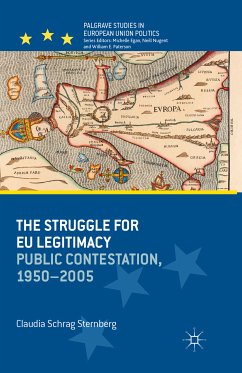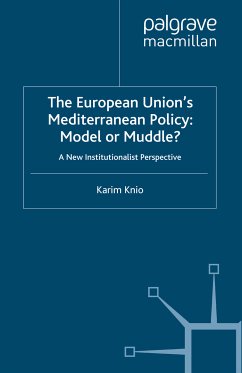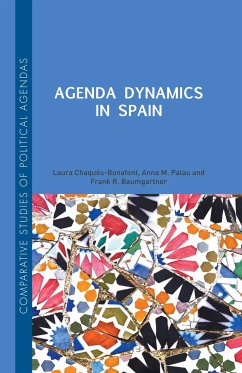
Agenda Dynamics in Spain (eBook, PDF)

PAYBACK Punkte
20 °P sammeln!






Spanish politics has been transformed. Using new techniques, this book looks at 30 years of Spanish political history to understand party competition, the impact of the EU, media-government relations, aspirations for independence in Catalonia and the Basque region, and the declining role of religion.
Dieser Download kann aus rechtlichen Gründen nur mit Rechnungsadresse in A, B, BG, CY, CZ, D, DK, EW, E, FIN, F, GR, HR, H, IRL, I, LT, L, LR, M, NL, PL, P, R, S, SLO, SK ausgeliefert werden.
Laura Chaqués Bonafont is Professor of Political Science at the University of Barcelona and Research Fellow at the Institut Barcelona d'Estudis Internacionals (IBEI). She is the director of the Spanish Policy Agendas Project (www.ub.edu/spanishpolicyagendas). Her main research interests are the analysis of agenda dynamics in comparative perspective, with special reference to the impact of the media, and interest groups. Anna M. Palau is Assistant Professor at the Department of Constitutional Law and Political Science at the University of Barcelona and member of the Spanish Policy Agendas Project. Her research focuses on the analysis of policy dynamics, Europeanization, media and public opinion and government-opposition dynamics. Her work has been published in Comparative Political Studies, West European Politics, Journal of Public Policy, and Journal of Legislative Studies, among others. Frank R. Baumgartner is the Richard J. Richardson Distinguished Professor of Political Science at the University of North Carolina at Chapel Hill, USA. He is one of the founders and directors of the US Policy Agendas Project and has published such books as Agendas and Instability in American Politics, The Politics of Attention,and The Politics of Information, all with Bryan D. Jones.
Produktdetails
- Verlag: Palgrave Macmillan UK
- Seitenzahl: 292
- Erscheinungstermin: 11. August 2015
- Englisch
- ISBN-13: 9781137328793
- Artikelnr.: 43588660
'Laura Chaques Bonafont, Anna Palau, and Frank Baumgartner deploy the vast database of the Spanish Policy Agenda Project to show how policymaking attention is a scarce commodity in the political process and how it affects policy outcomes. The book challenges current understandings of European politics by studying attention allocation along with the more standard factors of political preferences and governing institutions, and, as a consequence, offers new insights into Spanish politics as well as comparative politics more generally. It is a must-read for students of public policy processes, comparative politics, and Spanish politics.' Bryan D. Jones, J.J. 'Jake' Pickle Regents' Chair in Congressional Studies, University of Texas at Austin, USA
'This is a very important book for our understanding of the Spanish policy process during its recent democratic period. Very rich in providing original data, Agenda Dynamics in Spain introduces a sophisticated analysis of policy-making in a parliamentary democracy, focusing on the relations between the executive and the legislative in a context of multi-level government, from the regional to the European level. Making clear how policy agenda actually works, this book represents a milestone for public policy analysis in Spain and a very relevant contribution for the study of European comparative politics.' Jacint Jordana, Director of the Institut Barcelona d'Etudis Internacionals, Universitat Pompeu Fabra, Spain
'This is a very important book for our understanding of the Spanish policy process during its recent democratic period. Very rich in providing original data, Agenda Dynamics in Spain introduces a sophisticated analysis of policy-making in a parliamentary democracy, focusing on the relations between the executive and the legislative in a context of multi-level government, from the regional to the European level. Making clear how policy agenda actually works, this book represents a milestone for public policy analysis in Spain and a very relevant contribution for the study of European comparative politics.' Jacint Jordana, Director of the Institut Barcelona d'Etudis Internacionals, Universitat Pompeu Fabra, Spain
Für dieses Produkt wurde noch keine Bewertung abgegeben. Wir würden uns sehr freuen, wenn du die erste Bewertung schreibst!
Eine Bewertung schreiben
Eine Bewertung schreiben
Andere Kunden interessierten sich für


